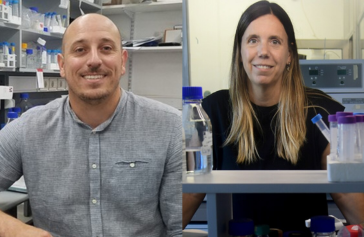Guska’s founders, Gonzalo Moratorio and Pilar Moreno, took part in a study that demostrated that the presence of coronavirus viral particles in red blood cells could facilitate the spread of the disease and be a pathway for systemic invasion throughout the body, beyond the respiratory system as previously believed.
The study, published in the prestigious scientific journal Cell Death and Disease, part of the Nature group, was conducted in collaboration with researchers from the Institut Pasteur in Montevideo, the Faculty of Sciences (Udelar), and the University of Buenos Aires.
The finding suggests that hemoproteins (a type of protein present in red blood cells that, among other things, serve to transport oxygen to the blood) could facilitate viral dissemination. On that basis, the scientific team estimates that in patients with covid-19, the severity of the disease could be reduced through treatments that target hemoproteins. ‘Our findings propose a paradigm shift in the therapeutic approach, taking advantage of the virus-heme interaction as a strategic hinge for intervention’, the study indicates.
Understanding the mechanism
The research emerged to gain a better understanding of the mechanisms of coronavirus spread, which are still not fully understood. ‘The ability of the virus to navigate between cell and cell, tissue and tissue, and therefore cause organ failure in some cases, is still a question that is not fully understood’, explained Moratorio.
The scientific team explored the effects the virus has on the body by combining clinical observations from autopsies of patients with covid-19 with data from infected mice. Specifically, a type of coronavirus that naturally infects mice was used to look for points of comparison with SARS-CoV-2 that affects humans. They arrived at the results thanks to the combination of several techniques and the collaboration of researchers from Uruguay, Argentina and Canada.
These findings help provide a more complete understanding of how the coronavirus acts and what potential treatments for patients might be. ‘Our findings propose a paradigm shift in therapeutic approaches, leveraging the virus-heme (virus and blood) interaction as a strategic hinge for intervention’, the study states.

